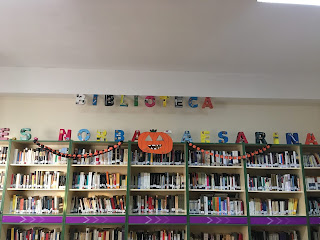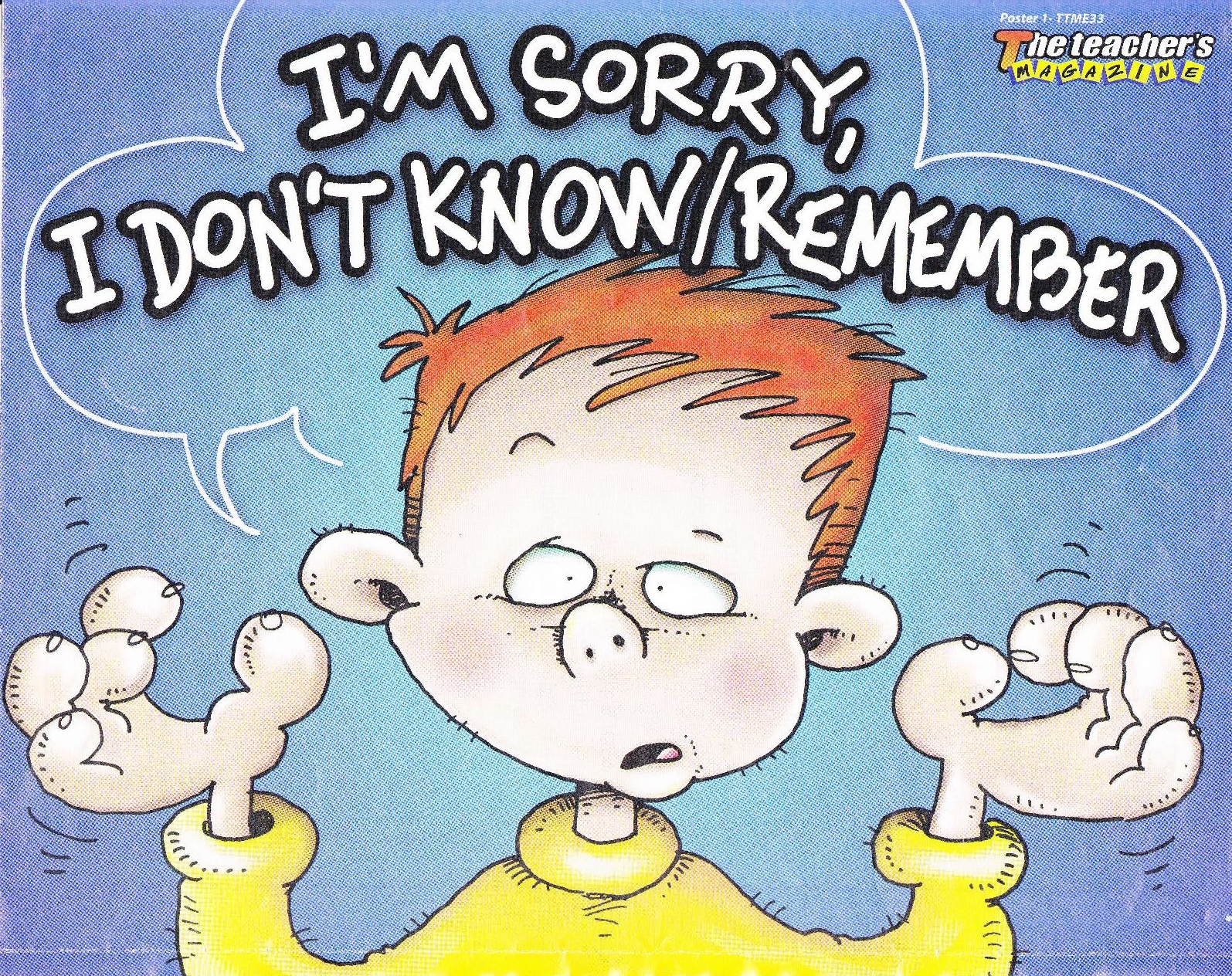ACTIVITY
Preparation for B1
(Picture by Laura Morán Domínguez, 1ºBCH.D)
jueves, 20 de diciembre de 2018
SOMETHIN' STUPID
Enjoy this beautiful song our teacher Iria Barcia has just posted and practise your listening and pronunciation skills:
ACTIVITY
ACTIVITY
domingo, 16 de diciembre de 2018
ENGLISH FOR BEGINNERS AT XMAS
Enjoy this Christmas video with a Polish protagonist. Unmissable, both hilarious and a tear jerker!
QUESTIONS
1.-Who
is the main character in the video?
2.-Does
the main character live alone?
3.-What
is the main character learning?
4.-What
does he do to learn?
5.-What
happens on the bus?
6.-Where
does he go at the end of the video?
7.-How
does he travel?
8.-Where
does he stay?
9.-Who
does he meet at the end of the video?
10.-So,
why is he learning?
jueves, 1 de noviembre de 2018
CELEBRATING HALLOWEEN IN THE LIBRARY
Norba School Library was transformed into a haunted place by the decorations set up by our students. Have look if you dare!!!
Congratulations for the great work!!!
Congratulations for the great work!!!
martes, 30 de octubre de 2018
HALLOWEEN RECIPES
Today our 4th year students delighted us with some Halloween recipes. Awards were given to "Revolting", "Presentation" and "Originality". The winners were Miriam Murillo and Lucía Fondón (Revolting), Carmen Ambrona and Sancho Quesad (Originality), María Mateos, Julia Rivero, Rebeca Merino and Ana Vázquez (Presentation). Congratulations to the winners and to all the participants who did a great job!!! And congratulations to our teacher Ana Isabel Rodríguez for designing this task!!!
lunes, 29 de octubre de 2018
TRICK OR TREAT
What do you fancy doing? Follow the links:
- Investigating the origine and history of Halloween?
http://www.halloween-website.com/history.htm
http://urbanlegends.about.com/od/halloween/a/History-Of-Halloween.htm
- Drawing? Plenty of ideas just going to Google images.
- Looking for Halloween rhymes?
- Describing how people around the world celebrate it?
http://www.novareinna.com/festive/world.html
- Searching for Halloween superstitions?
http://www.bored.com/oldsuperstitions/halloween.html
domingo, 21 de octubre de 2018
TALKING ABOUT BOOKS AND FILMS
Tired of always using the same vocabulary when talking about books and films. Here you have useful expressions to improve your presentations and writings. Don't miss them!
IELTS Books and Films Vocabulary
domingo, 7 de octubre de 2018
WHAT ARE THEY WEARING? WHAT ARE THEY DOING?
Watch this video and learn how to describe what people are wearing (colour, pattern, material) and what they are doing.
miércoles, 19 de septiembre de 2018
CLASSROOM LANGUAGE
Follow this LINK to see a presentation prepared by our teacher Iria Barcia and learn useful language for the classroom.
domingo, 16 de septiembre de 2018
12 TYPICAL MISTAKES SPANISH SPEAKERS MAKE
If Spanish is your mother tongue, you might make these mistakes. So watch out!!! Do you know the correct form?
1.-Estoy de acuerdo contigo.
Wrong: I am agree with you.
Right: __________________
2.-¿Cómo es tu mejor amigo?
Wrong: How is your best friend?
Right: a.- ________________________
b.-________________________
¿Cómo se llama esto en Inglés?
Wrong: How do you call this in English?
Right: ___________________________
3.-¡Vamos a tomar un café!
Wrong: Let's take a coffee!
Right: ___________________________
4.-Estoy haciendo un pastel.
Wrong: I'm doing a cake.
Right: _________________________
Estoy haciendo deporte.
Wrong: I'm making sport.
Right: ________________________
5.-Estoy aquí desde hace una hora.
Wrong: I am here since an hour ago.
Right: _________________________________
Estudio Inglés desde hace cinco años.
Wrong: I study English since five years ago.
Right: ________________________________
6.-¿Puede explicarme este problema?
Wrong: Can you explain me this problem?
Right: ______________________________
7.-Leí una noticia?
Wrong: I read a news.
Right: _____________________________
Tengo una noticia
Wrong: I have a new.
Right: ___________________________
Dame un consejo.
Wrong: Give me an advice.
Right: ___________________________
8.-Tengo 17 años.
Wrong: I have 17 years.
Right:____________________________
9.-Cuéntame una historia.
Wrong: Tell me a history.
Right: ____________________________
10.-Ver películas de terror es divertido.
Wrong: Watching horror films is funny.
Right: __________________________________
El partido de fútbol fue muy divertido.
Wrong: The football match was so funny.
Fue tan gracioso cuando te caíste.
Wrong: It was so fun when you fell over.
Right: ________________________________________
11.-No fui a la fiesta.
Wrong: I didn't went to the party.
Right: _____________________________________
Ella no hace sus deberes.
Wrong: She doesn't does her homeworks. (2 mistakes here!)
Right: ______________________________________________
12. Estoy aburrido.
Wrong: I am boring.
Right: _____________________________________________
https://www.europelanguagejobs.com/blog/common-English-mistakes-by-Spanish-speakers
To correct more typical mistakes, watch this video:
1.-Estoy de acuerdo contigo.
Wrong: I am agree with you.
Right: __________________
2.-¿Cómo es tu mejor amigo?
Wrong: How is your best friend?
Right: a.- ________________________
b.-________________________
¿Cómo se llama esto en Inglés?
Wrong: How do you call this in English?
Right: ___________________________
3.-¡Vamos a tomar un café!
Wrong: Let's take a coffee!
Right: ___________________________
4.-Estoy haciendo un pastel.
Wrong: I'm doing a cake.
Right: _________________________
Estoy haciendo deporte.
Wrong: I'm making sport.
Right: ________________________
5.-Estoy aquí desde hace una hora.
Wrong: I am here since an hour ago.
Right: _________________________________
Estudio Inglés desde hace cinco años.
Wrong: I study English since five years ago.
Right: ________________________________
6.-¿Puede explicarme este problema?
Wrong: Can you explain me this problem?
Right: ______________________________
7.-Leí una noticia?
Wrong: I read a news.
Right: _____________________________
Tengo una noticia
Wrong: I have a new.
Right: ___________________________
Dame un consejo.
Wrong: Give me an advice.
Right: ___________________________
8.-Tengo 17 años.
Wrong: I have 17 years.
Right:____________________________
9.-Cuéntame una historia.
Wrong: Tell me a history.
Right: ____________________________
10.-Ver películas de terror es divertido.
Wrong: Watching horror films is funny.
Right: __________________________________
El partido de fútbol fue muy divertido.
Wrong: The football match was so funny.
Fue tan gracioso cuando te caíste.
Wrong: It was so fun when you fell over.
Right: ________________________________________
11.-No fui a la fiesta.
Wrong: I didn't went to the party.
Right: _____________________________________
Ella no hace sus deberes.
Wrong: She doesn't does her homeworks. (2 mistakes here!)
Right: ______________________________________________
12. Estoy aburrido.
Wrong: I am boring.
Right: _____________________________________________
https://www.europelanguagejobs.com/blog/common-English-mistakes-by-Spanish-speakers
To correct more typical mistakes, watch this video:
lunes, 10 de septiembre de 2018
BACK TO SCHOOL WITH HUMOUR
WELCOME BACK TO SCHOOL AND TO BILINGUAL NORBA BLOG!
ACTIVITY 1.
WATCH MR BEAN TAKING AN EXAM. WHAT PROBLEMS IS HE HAVING? TALK TO YOUR PARTNER AND TRY TO DESCRIBE WHAT'S GOING ON.
SPEAKING: WHAT'S THE WORST EXAM EXPERIENCE YOU HAVE HAD?
HOMEWORK: GO TO THE COMMENTS AND WRITE ABOUT YOUR WORST EXAM EXPERIENCE.
ACTIVITY 2.
MATCH SENTENCES AND FORM 8 JOKES RELATED TO SCHOOL:
HOMEWORK: PREPARE A COMIC STRIP OR A CARTOON ON THE TOPIC "BACK TO SCHOOL WITH HUMOUR". IF YOU DON'T LIKE DRAWING YOU CAN PRINT PICTURES.
ACTIVITY 1.
WATCH MR BEAN TAKING AN EXAM. WHAT PROBLEMS IS HE HAVING? TALK TO YOUR PARTNER AND TRY TO DESCRIBE WHAT'S GOING ON.
SPEAKING: WHAT'S THE WORST EXAM EXPERIENCE YOU HAVE HAD?
HOMEWORK: GO TO THE COMMENTS AND WRITE ABOUT YOUR WORST EXAM EXPERIENCE.
ACTIVITY 2.
MATCH SENTENCES AND FORM 8 JOKES RELATED TO SCHOOL:
What did you learn in school today?
|
Class: Fred!
|
The first day of school wouldn't be so bad if…
|
Son: It was all right except for some man called "Teacher" who kept spoiling all our fun!
|
Teacher: Fred, go to the map and find North America.
Fred: Here it is!
Teacher: Correct. Now, class, who discovered America?
|
Because there was no history to study!
|
Mother: What was the first thing you learned in class?
|
it weren't followed by the second day of school, and the third day of school, and then the fourth day of school . . .
|
Mother: How was your first day at school?
|
Student: In jail!
|
Math teacher: A
man from Los Angeles drove toward New York at 250 miles per hour and a
man from New York drove toward Los Angeles at 150 m.p.h. Where did they
meet?
|
Student: I’m glad it’s Friday!
|
Teacher: I’ve had to send you to the principal every day this week. What do you have to say for yourself?
|
Not enough; I have to go back tomorrow!
|
Why was school easier for cave people?
|
Daughter: How to talk without moving my lips!
|
HOMEWORK: PREPARE A COMIC STRIP OR A CARTOON ON THE TOPIC "BACK TO SCHOOL WITH HUMOUR". IF YOU DON'T LIKE DRAWING YOU CAN PRINT PICTURES.
lunes, 9 de abril de 2018
domingo, 1 de abril de 2018
jueves, 1 de marzo de 2018
miércoles, 28 de febrero de 2018
PARTY TALK
https://dictionaryblog.cambridge.org/2014/12/23/party-talk-the-language-of-party-chat/
by Kate Woodford
With the party season in full swing (= at its busiest now), we consider the language of socializing (= enjoying yourself with other people). We’re looking especially at words and phrases which are used to describe the different ways that people behave at a party and the sort of conversations that party guests may have.
Some people are very sociable (= liking meeting people). For them, a party is an opportunity to meet and chat to many people. They may choose to mingle, moving around the room and talking to a lot of guests: I guess I’d better go and mingle with my guests.
Other guests may be meeting for the first time. They may just exchange pleasantries, meaning that they say things to each other which are polite and pleasant but not especially interesting or important: Sarah introduced us at her party and we exchanged pleasantries. Another way of saying this is to make small talk: He doesn’t especially enjoy making small talk with people he doesn’t know. The informal noun chit-chat is also used to refer to conversation about matters that are not important: I don’t even remember what we spoke about – I think it was just the usual party chit-chat.
Some people like to keep the conversation light-hearted (= happy and not serious). They may enjoy a bit of banter in which they make jokes with people and laugh at them: There was the usual banter between the guys. ‘Banter’ is also a verb: He stood around bantering with his colleagues for a while.
Not all conversation is fun and jokey, however. Two close friends may use the opportunity to have a heart-to-heart, talking seriously about their feelings on subjects that are important to them: Paul and Helen seemed to be having a heart-to-heart so I didn’t like to disturb them.
Elsewhere at the same party, a guest may see old friend that they have not seen for a while and may catch up (= hear that person’s news): It was so nice to see you at Nicole’s party and catch up. This phrase is also used as a noun: Let’s meet in the New Year and have a proper catch-up then.
If two people meet for the first time and immediately get on (= enjoy each other’s company), they may be said to (informal) hit it off: I introduced Zoe to your brother and they really hit it off. You might also say that they get on like a house on fire : I wasn’t expecting them to have much in common but they got on like a house on fire.
by Kate Woodford
With the party season in full swing (= at its busiest now), we consider the language of socializing (= enjoying yourself with other people). We’re looking especially at words and phrases which are used to describe the different ways that people behave at a party and the sort of conversations that party guests may have.
Some people are very sociable (= liking meeting people). For them, a party is an opportunity to meet and chat to many people. They may choose to mingle, moving around the room and talking to a lot of guests: I guess I’d better go and mingle with my guests.
Other guests may be meeting for the first time. They may just exchange pleasantries, meaning that they say things to each other which are polite and pleasant but not especially interesting or important: Sarah introduced us at her party and we exchanged pleasantries. Another way of saying this is to make small talk: He doesn’t especially enjoy making small talk with people he doesn’t know. The informal noun chit-chat is also used to refer to conversation about matters that are not important: I don’t even remember what we spoke about – I think it was just the usual party chit-chat.
Some people like to keep the conversation light-hearted (= happy and not serious). They may enjoy a bit of banter in which they make jokes with people and laugh at them: There was the usual banter between the guys. ‘Banter’ is also a verb: He stood around bantering with his colleagues for a while.
Not all conversation is fun and jokey, however. Two close friends may use the opportunity to have a heart-to-heart, talking seriously about their feelings on subjects that are important to them: Paul and Helen seemed to be having a heart-to-heart so I didn’t like to disturb them.
Elsewhere at the same party, a guest may see old friend that they have not seen for a while and may catch up (= hear that person’s news): It was so nice to see you at Nicole’s party and catch up. This phrase is also used as a noun: Let’s meet in the New Year and have a proper catch-up then.
If two people meet for the first time and immediately get on (= enjoy each other’s company), they may be said to (informal) hit it off: I introduced Zoe to your brother and they really hit it off. You might also say that they get on like a house on fire : I wasn’t expecting them to have much in common but they got on like a house on fire.
domingo, 28 de enero de 2018
EDUCATION IN CHINA
María Escudero, Lisa Chen and Mar Cabezas, 1st Bachillerato students, have
prepared this interesting presentation about Education in China. Thanks
to our Norba students and thanks to María Cortes, their teacher, for sharing.
martes, 23 de enero de 2018
EDUCATION IN KOREA
viernes, 5 de enero de 2018
Suscribirse a:
Entradas (Atom)











































